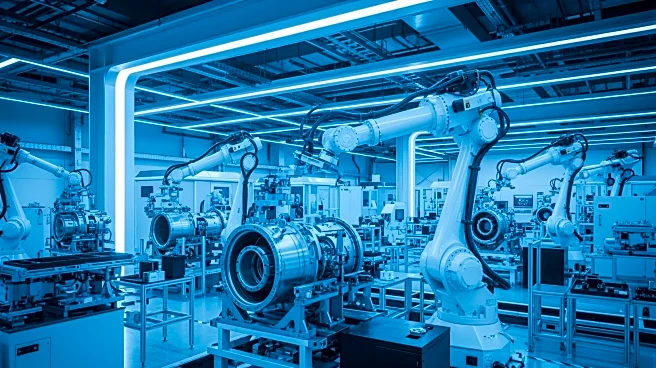What's Happening?
The aerospace industry is undergoing a significant transformation through the adoption of disruptive technologies such as artificial intelligence and industrial robotics. These advancements are not only
optimizing production processes but also enhancing supply chain reliability and enabling companies to anticipate disruptions. According to Deloitte, the operationalization of these technologies is unlocking pathways to resilience and long-term competitiveness. Companies are employing digital tools to continuously innovate, adapt to evolving customer needs, and introduce smarter, safer, and more sustainable solutions. The integration of AI and advanced data systems is facilitating real-time data collection and analysis, improving planning, tracking, and product traceability. This digitalization extends beyond the factory floor, fostering transparency and trust across the supply chain, and enabling more effective collaboration with partners.
Why It's Important?
The adoption of disruptive technologies in aerospace manufacturing is crucial for enhancing operational efficiency and contributing to sustainable development. By optimizing energy consumption and reducing waste, companies are making tangible contributions to decarbonization efforts. Digitalization is also addressing skilled labor shortages by retraining employees for specialist roles, thereby supporting employee retention and creating a more inspired and capable workforce. The demand for new expertise in areas such as data analysis and robotics maintenance is expected to grow, strengthening competitiveness and attracting talent in a challenging labor market. Companies embracing these technologies gain a competitive edge in hiring, increasing capacity and productivity.
What's Next?
As the aerospace industry continues to integrate disruptive technologies, companies are likely to focus on further refining their manufacturing processes and enhancing data analytics capabilities. This will involve investing in training and reskilling employees to acquire specialist skills in high demand. The industry may also see increased collaboration between manufacturers, suppliers, and customers, fostering greater transparency and trust across the supply chain. Companies that successfully integrate technology with the human workforce will be better positioned to navigate future challenges and capitalize on growth opportunities.
Beyond the Headlines
The digitalization of aerospace manufacturing processes is not only about efficiency but also about responsibility. By aligning with environmental goals, companies are contributing to sustainable development and decarbonization efforts. The integration of technology with the human workforce is essential for realizing the full potential of digitalization, as it empowers individuals to make greater contributions and supports employee retention. The industry must continue to invest in training and reskilling to address skilled labor shortages and ensure a resilient and capable workforce.









